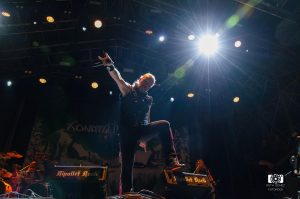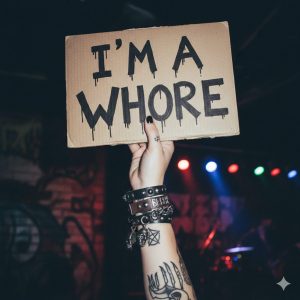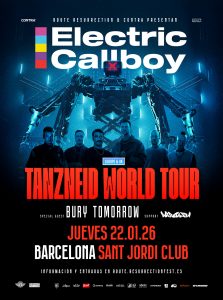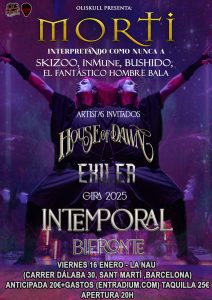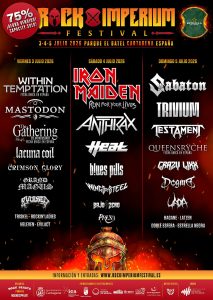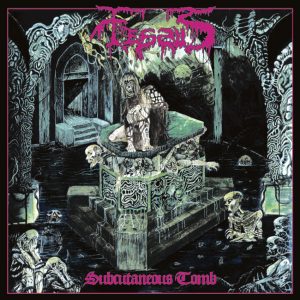MARTHE: Embracing Chaos: The Healing Power of Darkness

In this deeply introspective and candid conversation, Marzia of Marthe opens up about her journey from punk to black metal, shedding light on the evolution of her music, her powerful exploration of empowerment, and the raw emotions that shaped her debut album, Further In Evil. From the early influences of punk’s rebellious ethos to the introspective and personal themes that define her work, Marzia discusses the blend of DIY ethics, radical self-exploration, and feminist resilience. She reveals how her experiences with loneliness, healing, and self-empowerment are woven into her music, and how the act of creation has become her form of therapy. Whether touching on the gothic atmosphere of her sound, her vocal evolution, or the empowerment of women in the metal scene, this interview offers a deep dive into the art and spirit behind one of today’s most unique and fearless voices in black metal.
I. Personal and Artistic Journey
Punk Origins:
You come from a punk background. What came first for you—punk or metal—and what elements from the punk scene have you brought into your black metal sound?
Punk, because I grew up within the punk scene, where I encountered everything meaningful to me—musically, politically, and ethically. I crossed paths many times with metal, bands and friends, but I was more attracted by the activism of punk. The music of Marthe dragged me outside my comfort zone, but I carried with me the most important elements I know: the lo-fi music approach, staying true to my ideals, and the DIY ethic. Punk allowed me to unleash the urge to communicate that I had as a kid—playing music with no particular skills, traveling with my band, and sharing ideals through cut-and-paste art. Don’t get me wrong, these features aren’t exclusive to punk, but when I encountered both metal and punk at 13 years old, punk felt more immediate and natural to me. The classic metal bands I loved at the time were too technical and musically skilled so the constant failure in imitation made punk more accessible to me in the first place. Then it was also the messages—prioritizing substance over musical skill, political dissent driven by equality and social justice, and a rejection of gender and sexual stereotypes—that spoke to me. It was inclusive and cooperative. While I was seduced by the majestic sound of metal, at that stage of my life, in full rebellious turmoil, I wasn’t fully satisfied by translating lyrics with my basic English-Italian vocabulary. That’s when I got hooked by punk, and a journey that began over three decades ago started to unfold. The lines were blurry back then, my group was a mix of punk, goth, and black metal friends, all the misfits and weirdos of the city and surrounding areas met and hanged, the years 1995-1999 were particularly vibrant. While some of my black metal friends were drawn to grave-digging and church desecration, I was more focused on anti-war and anti-fascist protests. We had an amazing time together, drinking beers, tape trading, and sharing the music we loved despite our differences. As we grew older, we naturally drifted apart, but those formative years were incredibly inclusive, which has left me with an open mind toward all these music genres.
Punk Ideology vs. Metal:
Punk often carries strong political and ideological themes. How do you see the ideological differences (or similarities) between punk and black metal?
I must admit, first and foremost, that I’m not entirely sure whether I can place myself fully in the BM camp. As I’ve mentioned before, simply making a record that sounds like that doesn’t automatically make you part of a scene that the music might reference. Scenes are something to be trespassed, lived, encountered, and experienced on a 360° level. So, I must also say that my perspective on BM might be limited or incomplete even if I like that music a lot.
Initially, I thought about focusing on the differences, but I’ll start with the similarities: the underground roots and the DIY ethos align quite well, and that’s something I truly feel comfortable with when writing Marthe material. I also connect with the extreme stances on certain topics and the radical break from society’s norms.
As for the differences, I think they mainly lie in the themes or ideologies. Punk is strongly political, addressing issues like racism, anti-capitalism, and equality, whereas BM often revolves around introspection, occultism, philosophy, mythology, and anti-religious or nihilistic themes. BM critiques societal rules, but it tends to do so in a more personal, inward-facing way. (I’m not considering here all the controversial aspects BM might have, that has always been something pushing me a bit out because I couldn’t and still can’t separate the music from the ideas). Marthe, on the other hand, is the first time I’ve not focused on political themes; it’s more about my inner world and emotions. Marthe was born during a particularly tough personal period, and for the first time, I felt an urge to express myself—not just to make a statement about what I stand for or to scream against injustice, but to explore and express my personal feelings. I think there was a shift in my perspective. At a certain point in my life, I became more introspective than enraged at the world around me—maybe I was more angry with myself. I think the blend of black metal and punk opened up a lot of freedom for me to explore a space I was already comfortable in—DIY and extreme music—but with a fresh perspective. It shifted the focus from the collective energy of fighting together and a sense of community to something more introspective and rooted in loneliness, while also giving me the opportunity to experiment with new melodies and longer, more expansive songs.
Personal Connection to the Album:
What does this album mean to you personally, and what do you hope it will mean to others who listen to it?
I wrote it during a very dark two years of my life. The process took about 1.5 years, starting with the first single. During that time, I was experiencing loss in various forms, along with a deep sense of loneliness. For me, loneliness wasn’t about the absence of people—it was more of a personal journey, a time to redraw and redefine myself after some significant disillusionments. I couldn’t simply let those emotions go, so I poured them into the music instead. I hope listeners can find a few meaningful messages within it and feel the vibe of rage transforming into the best kind of healing. The title, Further In Evil, feels like an invitation to explore our darkest sides—allowing ourselves to embrace the chaos and grow worse outwardly, in order to ultimately be kinder to ourselves.
Empowerment and Self-Healing:
Your lyrics often touch on themes of empowerment and self-healing. How do these concepts shape the message of your album?
I was hoping people would understand how deep my wounds were and how much love I truly needed. My friends were there for me, of course, but it wasn’t enough—my sense of justice felt shattered, and the injustice I experienced grew larger and more consuming in my mind. The self-healing process began when I realized that no one could truly help me because I was weak, relying on external validation and refusing to face what I was going through. I was giving myself more attention than the world ever could, expecting something from people who didn’t owe me anything. Nobody really gave a fuck, and my attempts to clarify my pain came across as an endless, heavy repetition of the same story.
Eventually, I put on a mask for the world and unleashed my inner self. I began to accept everything—the loss, the injustice, the unfairness of fate. In that acceptance, I found power. I embraced all the chaos and disaster alone, forcing myself to swim through it. I didn’t drown. I reached the surface and floated on the debris of what was left. That’s what self-healing meant to me: embracing the pile of shit for what it was.
I became dead to those who victimized my essence, thrown away yet still riding forward on my own. I was moving further into the depths of evil, heading toward… [new album title redacted! 😂].
This is the second step in a trilogy that reflects this journey. I’m much wiser now than I was a few years ago, and writing all those lyrics helped me put my thoughts into words. It was a cure—a moment of reflection that gave me clarity and purpose.
Letting Go:
Is there an element of “letting go” in your music or in the creation of this album? What are you releasing or freeing yourself from?
I’m freeing myself from expectations, from the belief that I mean something to someone—not in a romantic or relationship sense, but on a basic human level. I’ve never truly experienced the pain of abandonment, nor have I been emotionally dependent on anyone or anything. I’ve always been a loner—or better yet, an introverted extrovert. But I’ve only recently discovered my true self, after a few shocking departures, and it made me realize I needed to let go of the idea that I could be significant to others. In the end, I was nothing, while others felt like the world to me—and that felt unfair. I wanted to embrace a more «evil» side, metaphorically speaking, so I could let my tender heart focus on what truly matters and what truly deserves my attention.
Lyrics as Therapy:
I’ve read that your lyrics are a form of therapy for you because you can’t afford formal therapy. Could you speak more to how songwriting helps you process your emotions and experiences?
I’m a total mess when it comes to emotions—I have too many emotions maybe or maybe being a Virgo doesn’t help, ha! It takes me forever to finish a lyric; it’s always overflowing with pages of thoughts. Then, I sleep on it and come back the next day, only to find some of those thoughts no longer feel relevant, so I erase them and start overthinking all over again. It becomes a kind of «caviardage» of conclusions that temporarily ease my disillusion, and I find a bit of comfort in something that finally makes sense. It’s like talking to the imaginary friend I never had. Sometimes, I’ll even search for specific poems or literature on certain topics once I’ve pinpointed the focus of the issue. And finding the topic of the issue is 99% of the game.
I love writing, scrapbooking, and creating fanzines. Releasing my brain dump onto paper really helps—it’s like asking myself questions and finding answers through deep, ongoing reflection.
II. Musical Style and Influences
Album Title:
What inspired the title of your debut album? Does it carry a specific meaning or message for you?
I’ve mentioned something similar above, but I’m trying to recall the exact moment when I put those three words together, and I can’t quite pinpoint it. I think it came to me when I was working on the refrain, and it went something like «…in evil,» so I just made up the slogan. Looking at it now, it reminds me of the mood in English Dogs’ «Forward Into Battle»—like a call to embark on a mission and return victorious. Am I evil (now)? No, unfortunately!!!
Gothic Atmosphere:
Your music has a distinct gothic atmosphere. How do you incorporate that mood into your black metal sound?
I suppose it’s all thanks to bands like Tiamat, My Dying Bride, Anathema, and Cathedral, not to mention Bathory, of course, and Amebix. These bands had a powerful influence on me during my extensive listening sessions in the 90s; their melancholic soundscapes shaped my mood and still transport me to specific worlds, whether real or imagined. When my creative mood kicks in, I find myself soaring through these landscapes. I just love melodies! And being able to create them, after over two decades of chaotic crust and d-beat, is something completely new to me. So, the first time I had the chance, I had to make it massive!
Italian Horror Cinema Influence:
There’s a certain darkness and tension in your music that feels almost cinematic. Do you draw any inspiration from Italian horror cinema in your work?
Not intentionally but that’s one of my main inspirations. I’m glad if it feels cinematic because that’s what happens to me, I literally imagine many parts of the music and get lost within.
In December 2022, while composing Marthe, I was simultaneously writing a boardgame’s soundtrack called Il Teschio Brilla Nella Notte (which you can find on Bandcamp), exploring a whole new dimension for me. Now, with the release of the new single The Vision – Holding the Eternal Grudge, the intro («The Vision») was originally meant to be a fake introduction for the opening scene of La Maschera Del Demonio (Black Sunday). But it turned into this wild, experimental drumming section instead. So, yes, there are elements of the traditional Italian Horror Cults in my mindscapes.
Versatile Vocals:
Your vocals are incredibly versatile, with a range that evolved from your EP to the full-length album. How has your vocal approach changed, and what drove that evolution?
Vocals are my bittersweet passion! In the beginning, it was a true nightmare for me. I simply couldn’t sing and ended up doing whatever made sense to me at the time. I have a few funny memories on the topic of «singing,» like recording myself in my car or practicing in a cellar, only to have the police show up because someone reported «a screaming woman». The moment I realized my true vocal range was while recording «Awake Arise Silence.» That’s when I truly shaped my vocals and discovered where they were meant to be. Funny enough, I figured it out while hiding inside a fridge cardboard box stuffed with pillows in my apartment—talk about a DIY studio moment!
Covering «Sin in My Heart» by Siouxsie:
Your cover of Siouxsie’s «Sin in My Heart» is both powerful and deeply emotional. What inspired you to take on this song, and how does it connect with the themes of your album?
I love Siouxsie, and “Juju” is my favorite album. My top song on it is “Sin In My Heart”—I’ve always been obsessed with the guitar work, which reminds me of a solo metal guitar. I once planned to create a full cover to reinterpret that guitar part in a metal style, complete with bendings and all. That, together with the “sin, forbidden desire theme” I can “read” in the song, was very appealing. But when the cover was finished, I couldn’t bring myself to mess with such a masterpiece.
Since I was deep in my “synth phase” at the time, I decided to try something different. I plugged in my piano and worked on a piano/vocals version instead. It ended up being something I truly loved. It’s special to me because that’s the moment I fully accepted my clean vocals, without all the effects I had relied on in my first demo (where I layered countless vocal stems). The result was so melancholic and raw that I fell in love with it—regardless of how it might be received.
III. Themes of Empowerment and Gender
Women in Metal as Empowerment:
In Western societies, playing in a metal band can still be seen as an act of rebellion and empowerment for women. Do you feel that way, and how does your gender shape your role in the black metal scene?
I’ve started this answer countless times and never felt fully satisfied because it’s such a vast topic with many nuances. The metal scene, like any other, is made up of individuals, so it’s difficult—and unfair—to generalize how its members think or behave, especially when it comes to topics like the role of women within it. To start, I can tell you that yes, Marthe has an amazing fan base, representing all genders and beyond. I’ve been fortunate to encounter and collaborate with wonderful, clever, and emancipated people who know exactly who I am, what I stand for, and what my values are.
That said, despite considering myself experienced and grown up (I’m currently in my fourth decade around the sun), and thinking I’d dealt with pretty much everything regarding women and extreme music was… wrong! I’ve been active in the punk scene my whole life, where women in music are the norm and topics like equality and feminism are prevalent. But Marthe, being my first metal band and, on top of that, a solo project, is exposing me to a whole new universe I had to explore.
For the first time in my life, I encountered sexualized comments and a few rude remarks about my feminist stance. Thankfully, only a few. When I released the demo, I stepped into the metal world with the “feminist” (and «antifascist») adjective following the band description. It was intentional—a red flag so people would know exactly where I stand. To me, a band is not just about the music; it’s important for people to understand what my ideals are. Punk has always been a safe space and comfort zone for me, where political investment is high. Metal, on the other hand, often tends to focus primarily on the music aspect.
Even though Marthe doesn’t have explicitly political lyrics, being a woman leading a metal project on my own reignited topics I thought were already settled, like the need to include the feminist label in my moniker. I felt I was once again in the position of inspiring other women, much like I did when I was the only female punk drummer in Italy. I felt it was important to carry the feminist label with me, even though I don’t feel the need to prove anything anymore. But some people didn’t understand why it was so important for me.
I could go on forever talking about how I started my music journey in the Riot Grrrl/Queer movement, my involvement in the punk scene to promote emancipation on musical, sexual, and personal levels alongside many other women like me, or how deeply important political investment is to me. But in the end, more simply, yes—being a woman and playing in a metal band is still a political act of rebellion and emancipation for me. Narrow-minded attitudes won’t vanish unless they are crushed by the numbers, quality, content, and commitment of women in music. Not because we have anything to prove, but because we have so much to offer. Often, insecurity, the fear of judgment on our performances, or the perception of being a minority can hold our potential back.
I love beastly and excessive frontwomen. I love mixed bands. I love seeing women just having fun, regardless of genre conventions. And more than that, this applies to all genders—an act of rebellion in music is simply not giving a fuck and feeling free to express yourself however you want. Being a woman just means we have even more boundaries to fight against.
Another point I’d like to make is that my perspective on feminism has evolved since my teenage years. While I still fight for the same collective causes—equal rights, reproductive rights, the importance of emotional education, and advocating for minorities—I’m also walking a personal path of emancipation. Being 43 and childless in a country like Italy, where motherhood is often still seen as a life goal, adds a layer of complexity. Trying to maintain an active music career, with shows and touring, in a country where arts and culture are often undervalued, is definitely a challenge and many time I fail or I have to decline because my job requires my presence. I’m fighting to resist giving up or resigning to the expectations that daily life and society often impose. I want to persist in my position, standing firm in my beliefs, and continue taking the front line—both personally and collectively. Many years ago, I met a very strong and powerful person whose life inspired me to embrace an alternative role for women. From the outside, it might not seem like it, but Italy is still a deeply traditional country with entrenched gender roles, not to mention the significant influence of the Church and Christianity on women’s lives. So, alongside my feminist stance, I’m striving to lead my own personal revolution against female stereotypes, aiming to grow into a woman who is probably less conventional than society expects me to be but still free, playing music, touring and not giving a fuck.
Political Archetypes:
Although your band isn’t political, as a woman in metal, it’s easy to draw connections to powerful archetypes like Valkyries and witches. How do these figures influence your work, and do you see them as political symbols?
There’s a whole universe to dive into! I feel this deeply when writing the lyrics. The point of view is often dark or haunted, as if the speaker is possessed or battling a visible or invisible demon. Sisters of Darkness accidentally became a sort of collective hymn, even though it was shaped around the ancient figure of the Accabadora—a female figure in Sardinia who would end the lives of the weak, elderly, and sick.
The video was built around the symbol of a black liquid that enveloped my body and face, not intended as face paint, but more as a representation of the original sin we carry as a stereotype—filthy, unsacred, the darkest side of human nature according to those who seek to vilify women like for example religions.
The vocals are the most cinematic moments in terms of impersonation. When I sing, I feel the power of thousands of lost battles, the fierce hearts of those who carry broken hearts, stabs in the back, or tears. It’s the collective loneliness of wounded legions of souls. I invented “Valkyrian Metal” to define my genre, it was a sort of inside joke in the beginning but then I started to like it, intended to flip the point of view from the Viking strong man to a warrior woman somehow, even if I’m too Italian to be even a little Northern ahah! But the idea was let’s flip the imagery and let’s get driven by a horde of kickass female creatures.
Album Cover Art:
The album cover is striking and has a witchy aesthetic. What was the inspiration behind this visual? Do you see it as connected to your music’s themes of empowerment?
The cover ended up being a frame taken from a video I filmed the year before for the B-side of the Victimized tape, Embers. I was delving into ancient symbols related to fire, and I came across the symbol of Vesta’s fire, which was exactly the same as the one on the stick. Since the video involved setting a few things on fire, it was the perfect match.
Initially, I wanted a different cover, but both Silvia (a friend and filmmaker) and Mariya (a friend and painter) insisted that I submit the picture to Southern Lord, and they agreed. So, that became the final choice. I love it. It wasn’t easy to see myself on the front cover, but getting back to a few questions earlier, it’s okay to be in the front and take up space. In it, as well as in all the videos and almost all the pics, I was with no makeup and casual clothes, that was also empowering: no filters, just me.
Feminist Influences:
Feminism plays a role in your lyrics. Are you influenced by any particular feminist movements within music, and if so, who were your role models when you were younger?
I don’t explicitly place feminism in my lyrics; it’s more about the fight for survival during the darkest moments, relying on ourselves. Beyond Sisters of Darkness, the themes in my music are neutral—I want everyone to be able to reflect in the words. Suffering has no gender nor identification.
Back in the day, I had a few Riot Grrrl bands, and the role models that influenced me the most were absolutely Bikini Kill and Tribe 8 for their content, L7 and Lunachicks for their attitude, and Voodoo Queens for their forever-life anthems like «Supermodels Superficials.»
IV. Social and Political Influence
Themes of Victimization and Injustice:
Themes of victimization and injustice seem to appear in your work. Are these drawn from personal experiences, or are there larger social issues that drive your music?
It’s all on a personal basis. It’s about being hurt by the people I loved, realizing the power of gathering my own strength to become even stronger by suppressing feelings, no longer allowing myself to suffer or expect anything from anyone.
Injustice, too, is personal. It’s about being unable to change things that are inherently unfair and impossible to alter, surrendering to the injustice of fate or accepting that we must rely on what happens, with no power to change it for the better.
Victimized was probably mistranslated by me. The true meaning was more like, «I want to victimize, to torture someone for what happened.» I’m only just realizing there’s a whole hell in my brain, haha!
Political Influence on Art:
Although Marthe isn’t explicitly a political project, the political and social changes around us often influence our art. Do the political issues you’re passionate about find their way into your music, even indirectly?
As mentioned earlier, I’ve written political lyrics with my punk bands—addressing society’s double standards, capitalism, multinational corporations, injustice, and the lack of rights. However, Marthe is the only project where I allow myself to explore another dimension, one that’s more connected to personal issues and inner turmoil. It’s a deeply healing process that helps me let things out when I need to, and I truly cherish those moments of introspection, where I can be alone and fully let myself go.
The political elements in Marthe are more implicit, tied to who I am and the beliefs I stand for: antifascism, feminism, anti-clericalism and, most recently, support for the Palestinian cause.
Support Teacher Role:
You work as a support teacher for male migrants and refugee teens in vocational school. How does this deeply personal and challenging work affect your art and creative process?
I’ve been working in the fields of migration and vulnerability for 20 years, so I’m deeply sensitive to these topics. I grew up a lot doing my job, antiracism is fundamental to me, and I’ve always strived to remain clear and analytical when examining the facts, especially in this far-right Italian government made of fake news and far-right bullshit propaganda. My work impacts me significantly in terms of both schedule and stress. I have an extensive work routine that leaves me with limited time to focus on music, compose, or dedicate myself fully to my artistic outlets. Touring is also restricted to my scheduled vacation periods, which means I can’t play as often or as freely as I’d like to. It’s also a very chaotic job—being constantly exposed to screaming teenagers makes me crave silence and quiet spaces during my time off. As a result, I’ve dramatically reduced the amount of time I spend listening to music, which I deeply regret. One of my resolutions for 2025 is to carve out more time for myself and my passions, allowing me to reconnect with what truly inspires me.
V. DIY Ethic and Artistic Approach
DIY Ethic:
You’ve maintained a DIY ethic throughout your career. Why is this approach so important to you, and how does it align with your values as an artist?
Thank you for this question, I’m afraid it won’t be short haha!
I maintained a DIY ethic because it strikes the perfect balance between imagination and action—it’s fair, immediate, accessible, creative, unique, non-profit, supportive, imperfect and transcends the lack of resources, making it an incredible tool for equality despite social differences. It aligns with my values as an artist because profit was never a priority for me. I have a job that allows me to be completely free in pursuing my one true passion, music, and I’ll fight for this freedom forever. DIY has always been my way of turning ideas into reality without external interference, has always been a choice and never an opportunity to discard in favor of better conditions. This approach is important because it allows me to stay true to myself. However, as I mentioned before, I strive to be honest in recognizing how the modern world is constantly changing. I’m fully aware that compromises are more and more part of daily life and that things are currently evolving. I’m embracing the present with an open mind and without too much nostalgia or gatekeeping but still doing it the “old way” for what it’s possible. For example, self-recording and self-releasing Marthe was one of the most rewarding aspects of this journey. When I began working on the first songs, I knew I had two choices: go the highly professional route, which might result in not getting anywhere, or do it with the resources I had, accepting some imperfections but making Marthe a reality. I chose the latter, trusting in the authenticity of the process and deeply influenced by the raw, seducing power of the classic black metal records I was digging in the 90s. I told myself: it’s 2017 but let’s do it the exact way I would have done it in 1995 if I had the right equipment (I had nothing back then ha!). Beyond the music, I also love creating unique merch, incorporating handcrafted items, collaborating with friends and doing everything not just on my own, but exactly the way I envisioned it in the form and in the philosophy. When I first got in touch with Southern Lord, it was my first experience stepping out of my small comfort zone. However, the label’s solid history and the immense freedom they gave me made it such a heartwarming experience that I felt completely comfortable despite it being something entirely new to me. And this happened when I was 40, after years of being firmly rooted in doing everything myself.
Since the very beginning, I’ve always self-released my music. It was deeply personal and meaningful to me. It allowed me to build connections that feel warm and still relevant to me. Friends started DIY labels and distribution networks to promote bands and share music, and we even found creative ways to save money, like putting soap on stamps to reuse them. We traded everything—fanzines, crafts, clothes—and built a national and international community that thrived on mutual support through benefits and demonstrations. We toured so many countries with just maps and home phone numbers—it’s hard to believe we actually made it. Musically, we never sought validation from institutions, we played squats and stepped out of society as much as we could; instead, we created or joined networks of like-minded people where connection and collaboration were everything. I now observe “my world” changing, the lack of squats or DIY spaces in Italy is awful and this brings along many changes, the scene is weaker and punk looks less appealing to younger generations that merge the underground in a total new way, from music consumption with online platforms to hybrid styles, but I’m glad DIY is still relevant to many people.
DIY has always felt very personal to me, though not everyone is drawn to that kind of creative process. I remember doing scrapbooking as a kid, using family photos to create journals and stories. Growing up in a small, uneventful town, I had little to do but be a countryside kid. Then, at nine, I got my first tape player. I’d record my favorite songs off the radio to make mixtapes, which I’d give to my dad for the car, proudly labeling them “Mixed by Max” (no idea why that was my nickname). I couldn’t stop playing “18 and Life.” It was about taking the world around me and reshaping it into something I could call my own.
I was a good pianist in music school from ages 7 to 13, but after seeing Nirvana on TV, I quit classical music to pick up guitar. The raw simplicity of a power chord changed everything. Surrounded by a cool gang of junior high friends, we dove into new music together. I had always been a huge Queen fan, but when I first saw Nirvana, my whole perspective shifted. A few months later, I discovered Sepultura, Metallica, Extreme Noise Terror, and L7, and my musical world completely shattered. I couldn’t just be a witness—I had to make it my own. I was fascinated by the origins of those bands, their early years, and the demos. Then, thanks to their t-shirts, punk came into my life, and the best metal-punk era of my life kicked off. In the streets, at shows, and in the practice room, it was all chaos, energy, and being at the forefront of creating the world I wanted and still want to live in.
That’s all from our side. It’s been a pleasure to have you. Thanks for taking the time. If you’d like to add some final words, it’s your turn.
THANK YOU FOR WAITING FOR ME, IT TOOK ME FOREVER!






